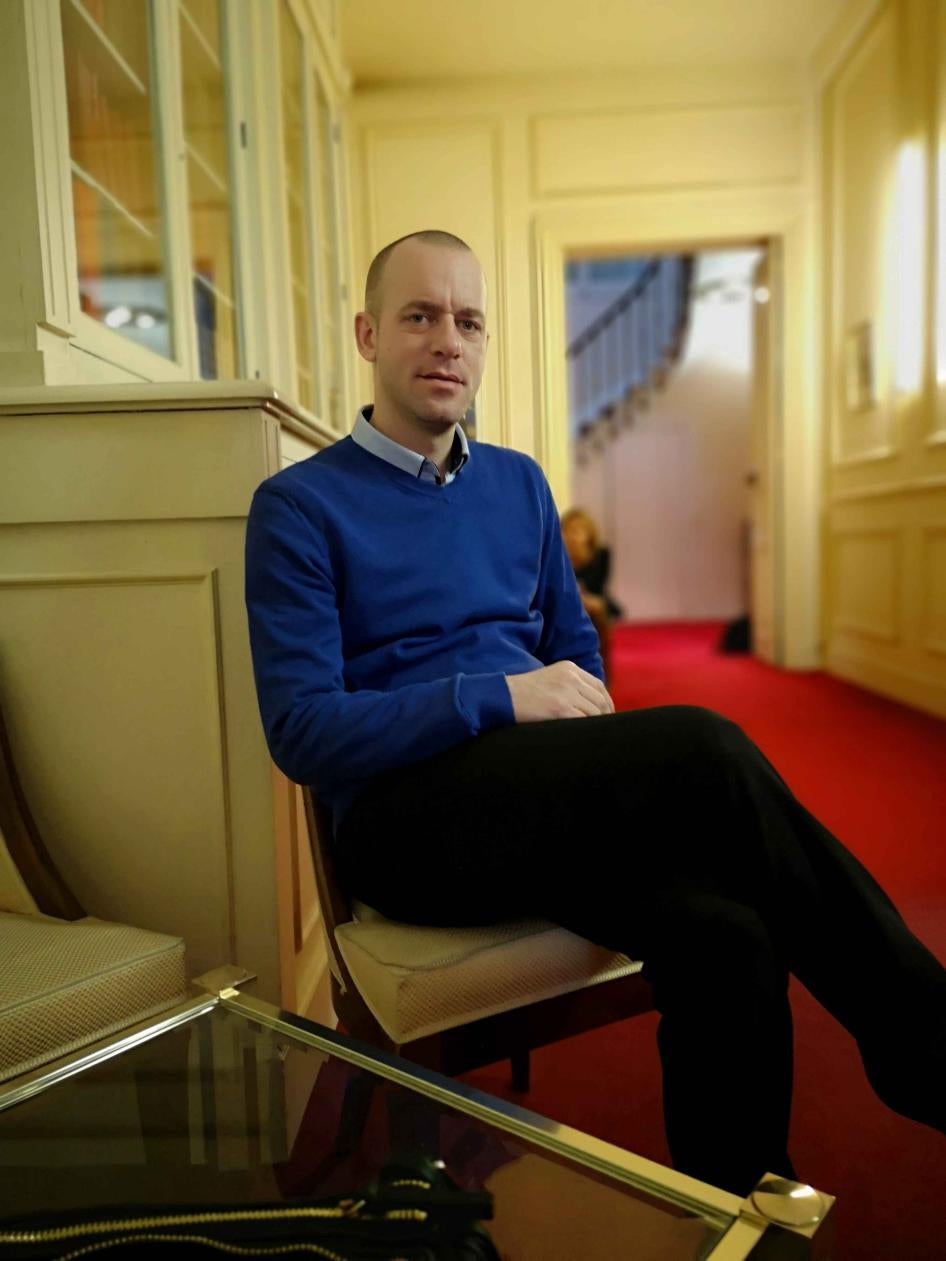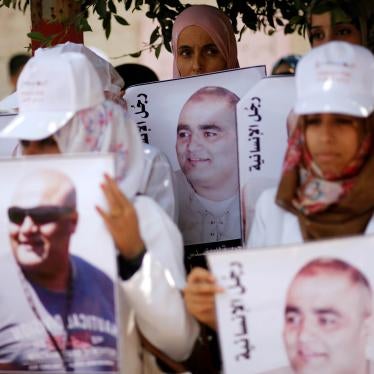(Jerusalem) – Israeli authorities should immediately release the French-Palestinian human rights worker Salah Hamouri from administrative detention and reverse the decision to revoke his residency status in his native Jerusalem, Human Rights Watch said today. On March 7, Israeli authorities detained Hamouri, a lawyer who works with the Palestinian prisoner rights group Addameer, which Israeli authorities outlawed last year, and have held him since in administrative detention without trial or charge, based on secret evidence.
On October 17, 2021, Israel’s Interior Ministry had revoked Hamouri’s residency status on the basis of “breach[ing] allegiance” to Israel, a move that could trigger his expulsion from occupied East Jerusalem. International humanitarian law expressly forbids an occupying power from compelling people under occupation to pledge loyalty to it. Residency revocations are among the policies that make up Israeli authorities’ crimes against humanity of apartheid and persecution against millions of Palestinians.
“Israeli authorities have detained Salah Hamouri without trial or charges for months, outlawed the human rights group he works for, and revoked his legal status in Jerusalem,” said Omar Shakir, Israel and Palestine director at Human Rights Watch. “Hamouri’s plight embodies the struggle of Palestinian human rights defenders challenging Israel’s apartheid and persecution.”
In the early morning of March 7, Israeli forces arrested Hamouri, a 37-year-old Palestinian Jerusalemite with French citizenship, at home in East Jerusalem. Hamouri’s parents told Human Rights Watch that the Israeli army confiscated three cell phones and a laptop, the latter of which has not been returned. The army issued a three-month administrative detention order against Hamouri on March 10 and renewed it on June 6. The order expires on September 5 and can be renewed.
The military courts based their decisions to detain him on secret information they allege points to Hamouri’s involvement in the activities of the Popular Front for the Liberation of Palestine (PFLP), a Palestinian political movement with an armed wing. Israeli authorities have not publicly put forward any evidence to justify this claim. Even if such evidence exists, to detain Hamouri for mere association or political activism with the group without any evidence of his involvement in an act of violence violates his right to freedom of association.
During the first few months of his detention, Hamouri joined hundreds of other detainees in a boycott of military court proceedings over Israeli authorities’ sweeping use of administrative detention. The detainees suspended their boycott on July 1, and Hamouri appealed his administrative detention order. On August 4, an appellate military court upheld the order.
According to Addameer, Hamouri said that in July Israeli authorities classified him as a high-security detainee following an open letter he wrote about his plight to French President Emmanuel Macron. As a result of this designation, the authorities transferred him from Ofer Prison in the occupied West Bank to Hadarim Prison inside Israel, though international humanitarian law prohibits transferring residents outside of occupied territory. According to Addameer, Israeli forces shackled him and repeatedly searched and frisked him during the hours-long transfer and had him spend the night in a poorly ventilated metal cage in Ramleh Prison in central Israel.
Israel’s Interior Ministry revoked Hamouri’s residency under a 2018 amendment to Israel’s 1952 Law of Entry that authorizes the revocation of the permanent residency of anyone suspected of “breach of allegiance” to Israel. In a letter to Hamouri, reviewed by Human Rights Watch, the Interior Ministry points to Hamouri’s alleged membership in and activities with the Popular Front for the Liberation of Palestine as the basis for the residency revocation, claiming he engages in “hostile, dangerous and significant activity against the state of Israel.”
In December, Israel’s National Social Security Agency terminated his health insurance due to his “leaving the country” and alleged lack of “proof of residency.”
Hamouri challenged the revocation and sought an injunction to block the deportation until the end of the proceedings. However, on March 10, the Israeli Supreme Court upheld a lower court’s denial of the injunction request, citing “secret information” that Hamouri posed a “security threat.” This decision removes any legal barrier to the Israeli government expelling Hamouri.
The Israeli rights group HaMoked, which represents Hamouri in the matter alongside Israeli lawyer Leah Tsamel, said that the court set a February 2023 date to hear the deportation challenge, delaying it until it rules on another case challenging a 2008 law allowing Israel to revoke a person’s citizenship based on “breach of loyalty.” In July, the court upheld the 2008 law.
The Interior Ministry had revoked the residency of five other Palestinians from occupied East Jerusalem on the basis of “breach of allegiance” as of the end of 2021, based on Interior Ministry data provided to HaMoked.
The Fourth Geneva Convention expressly states in article 68 that people under occupation owe no “duty of allegiance” to the occupying power. Article 45 of the 1907 Hague Resolutions forbids “compel[ling] the inhabitants of occupied territory to swear allegiance to the hostile Power.” By effectively forcing Palestinians from East Jerusalem to leave their homes, residency revocations amount to forcible transfer, as Human Rights Watch has documented. Undertaken as part of a set of policies to solidify a Jewish majority in Jerusalem, residency revocations contribute to maintaining Israel’s apartheid and persecution against millions of Palestinians.
Less than a week after revoking Hamouri’s residency, Israeli authorities declared Addameer and five other prominent Palestinian civil society groups as “terrorist” and later “illegal” organizations, based also on secret evidence they claim points to ties with the Popular Front. In November, Front Line Defenders uncovered, and Citizen Lab and Amnesty International confirmed, the hacking of Hamouri’s phone, as well as those of five other Palestinian rights defenders, with the Israeli company NSO Group’s Pegasus software.
As of August 1, Israel held 671 Palestinians in administrative detention, up from an average of 492 between April 2021 and March 2022, according to statistics that the Israeli Prison Service provided to HaMoked.
Israeli authorities should cease the widespread practice of holding Palestinians in administrative detention without trial or charge, Human Rights Watch said. While the law of occupation permits administrative detention as a temporary and exceptional measure, detaining hundreds of Palestinians, many for prolonged periods, with no end in sight far exceeds what the law authorizes, Human Rights Watch said. In 2014, the United Nations Human Rights Committee called on Israel to “end the practice of administrative detention and the use of secret evidence in administrative detention proceedings, and ensure that individuals subject to administrative detention orders are either promptly charged with a criminal offence, or released.”
Israeli authorities previously held Hamouri in administrative detention between August 2017 and September 2018. They also imprisoned him between 2005 and 2011, three years of which he spent in pretrial detention before a military court sentenced him to seven years in prison for charges related to an alleged plot to kill Israel’s former chief rabbi. He was released as a part of a prisoner exchange deal. In 2011, then-French Foreign Minister Alain Juppé said that the case against Hamouri lacked strong evidentiary support. Human Rights Watch has documented that Israeli military trials, which have a near 100-percent conviction rate, fall well short of any standards of justice.
In 2016, Israeli authorities deported Hamouri’s wife, Elsa Lefort, a French national, and banned her from re-entering Israel for 10 years, citing “security reasons,” separating Hamouri from her and their children, then ages 6 and 1. The ban prevents his family from visiting him in detention.
Reflecting on the harassment he has faced in a piece published in the Jacobin the day before his arrest in March, Hamouri wrote, “these actions are directed toward one single aim: forcing me to leave Palestine.” In April, Hamouri filed a criminal complaint in France against NSO Group over the hacking of his device and in May a submission to the International Criminal Court focused on the Israeli government’s actions against him. In May, Human Rights Watch and 11 other civil society groups called on France to press Israel to stop violating Hamouri’s rights.
“Through Salah Hamouri, Israeli authorities are escalating their all-out assault on Palestinian civil society and seeking to set a dangerous precedent that would allow them to more expeditiously force out Palestinians,” Shakir said. “French authorities should press Israel to stop harassing Hamouri.”








